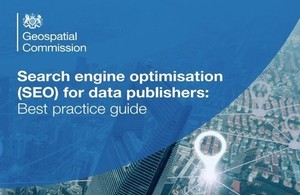New guide helps find and classify geospatial datasets across search engines
The Geospatial Commission and its six partner bodies have published a guide to make it easier to find and classify geospatial datasets across all search engines.

The Geospatial Commission and its six partner bodies have released Search Engine Optimisation (SEO) for publishers: Best practice guide to make it easier to find and classify geospatial datasets across all search engines.
This is the second in the series of guides to improve discovery and usability of geospatial data, after the publication of the Linked identifier schemes: Best practice guide last year.
The guide has been created because most users seek out geospatial data using common search engines and at the moment these are not necessarily finding or prioritising the authoritative national datasets. By following the tips in the guide data publishers can make their data easier to find by users who can then devote more of their time to joining it with other data sets and carrying out analysis to provide insight and support better decision making.
Thalia Baldwin, Geospatial Commission Director, said
Again, our Partner Bodies are working collaboratively and drawing on their network of peers across government to produce a new guide that will help to make a real difference to how easily geospatial data can be found. This guide sits alongside the first one we published on Linked Identifiers and together they provide a valuable resource for data publishers who are interested in increasing the use and value of their data.
Shona Nicol, Head of Data Standards, Scottish Government, added:
By implementing these recommendations data publishers stand to benefit from increased visibility of their data among a wider audience, while people wanting to use geospatial data are more likely to find what they are looking for. For example, by using this guide the Scottish Government has already identified that its webpages are not being optimally indexed by search engines because they are not tagged using the industry-standard markup language Schema.org. By making this change the Scottish Government will dramatically increase the chances of potential users finding its data.
The Geospatial Commission would welcome feedback on its guides. If you would like to participate please contact [email protected].